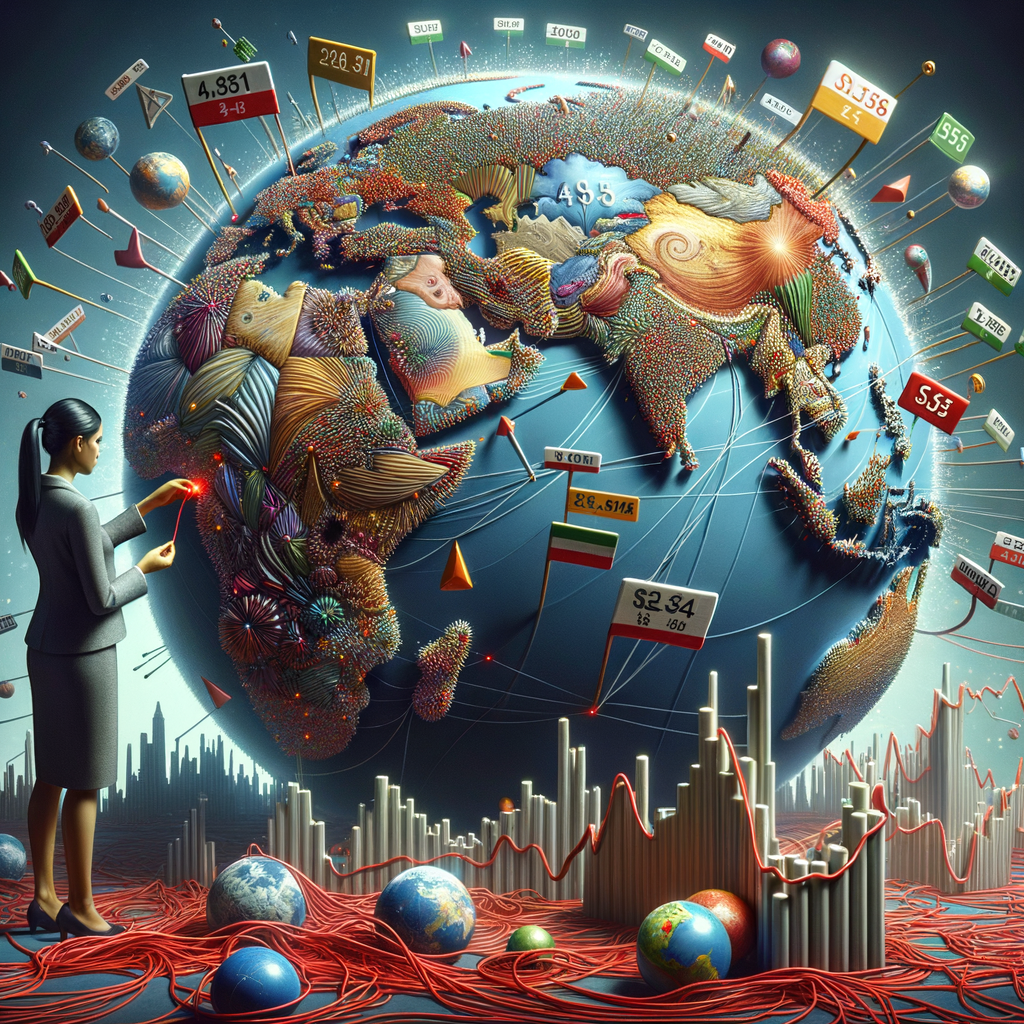Understanding Forex: A Brief Overview of Currency Trading
The foreign exchange market, commonly known as Forex, serves as the largest financial market in the world, with daily trading volumes exceeding $6 trillion. In Forex trading, currencies are exchanged in pairs, such as EUR/USD or GBP/JPY. This trading system allows investors and companies to hedge against international currency fluctuations, conduct international business, or speculate for profit. Understanding Forex requires familiarity with various market participants, including central banks, financial institutions, corporations, and retail traders.
Forex operates 24 hours a day, five days a week, across major financial centers globally. This continuous nature of trading means that currency values are constantly fluctuating based on supply and demand dynamics. Currency values can be influenced by a multitude of factors, including interest rates, inflation, political stability, and economic performance. Therefore, Forex traders must be adept at analyzing both historical data and current events to make informed trading decisions.
The decentralized nature of Forex trading also means that it lacks a physical exchange, relying instead on a network of banks and brokers to facilitate trades. This offers traders the flexibility to enter and exit positions across different time zones and market conditions. As globalization continues to evolve, the Forex market becomes even more intertwined with global events, making it crucial for traders to stay updated on international developments.
Understanding the essential mechanics of Forex is just the starting point; the intricate relationship between global events and currency values is where the true complexity of currency trading lies. Traders who can effectively interpret these developments gain a competitive edge in the market.
The Impact of Geopolitical Events on Forex Markets
Geopolitical events are among the most significant factors affecting Forex markets. Political instability, conflict, and diplomatic relations can lead to substantial currency fluctuations. For example, tensions between countries often result in a flight to safety, where investors flock to stable currencies like the US dollar or Swiss franc, leading to appreciation of those currencies.
Conversely, geopolitical stability can bolster a nation’s currency. For instance, when elections yield favorable outcomes, perceived as enhancing a country’s economic prospects, currencies can strengthen. A notable instance was the British pound’s rise following the 2019 election, where a decisive victory by the Conservative Party led to optimism regarding Brexit negotiations.
Central banks are also impacted by geopolitical events, as they may adjust monetary policy in response to shifting political landscapes. For instance, tensions between the US and China have influenced the Federal Reserve’s interest rate policies, which in turn affect the value of the US dollar. Understanding these political dynamics is crucial for traders, as currency markets often react sharply to news regarding international relations.
In conclusion, geopolitical events create immediate and sometimes volatile effects on Forex markets. Traders must remain vigilant and informed about global political climates to effectively manage risk and seize potential trading opportunities.
Economic Indicators: The Key Drivers of Currency Fluctuations
Economic indicators serve as critical signals directly impacting Forex trading. Metrics such as GDP growth rates, employment statistics, inflation rates, and trade balances are closely monitored by traders for insights into a country’s economic health. For instance, a strong jobs report typically leads to a currency’s appreciation, as it suggests economic strength and may prompt central banks to consider tightening monetary policy.
The release dates of these indicators can create market volatility. Traders often prepare for significant reports, such as the US Non-Farm Payrolls or the Consumer Price Index (CPI), knowing that they can cause sharp movements in the Forex market. Anticipating these releases and their potential impact on currency pairs is a vital strategy that traders employ.
Furthermore, the interpretation of economic data can vary. For instance, a lower-than-expected GDP growth rate may initially lead to a currency depreciation. However, if analysts foresee a swift recovery, the currency might stabilize or even appreciate in anticipation of future economic strength. Therefore, the context of the data is often as crucial as the numbers themselves.
Ultimately, economic indicators form the backbone of Forex trading strategy. Traders who can analyze and interpret these indicators in the context of broader global events often find themselves better positioned to make informed trading decisions.
How Natural Disasters Influence Forex Trading Dynamics
Natural disasters can have profound impacts on Forex markets, often triggering immediate reactions in currency values. When a significant natural disaster occurs, such as an earthquake or hurricane, it disrupts economic activity, damages infrastructure, and can lead to a decrease in a nation’s GDP. Consequently, the affected country’s currency may depreciate as investors reassess economic growth prospects.
An example is the 2011 earthquake and tsunami in Japan, which led to a temporary decline in the Japanese yen. The disaster caused extensive damage to critical industries, prompting fears that Japan would have to sell off foreign assets to fund recovery efforts. This situation increased the supply of yen in the market, leading to its depreciation against other currencies.
Moreover, natural disasters can also influence sentiment in the Forex market. Traders might be more risk-averse following such events, leading to a flight towards safe-haven currencies like the US dollar. This phenomenon exemplifies the interconnectedness of human sentiment and currency values, as fear and uncertainty can drive trading behavior.
Overall, natural disasters serve as stark reminders of the vulnerabilities within global economies and highlight the need for traders to consider such events in their analysis of currency movements. The dynamic interplay between environmental factors and economic stability shapes Forex trading in significant ways.
The Role of Central Banks in Global Currency Valuation
Central banks play a pivotal role in the Forex market, often acting as the linchpin of currency valuation. Their policies regarding interest rates, inflation targeting, and monetary supply directly influence the strength of their respective currencies. For instance, if a central bank signals an intention to raise interest rates, the currency typically appreciates as investors seek higher returns.
Central banks also engage in open market operations, buying and selling government securities to control money supply and influence interest rates. Through these mechanisms, they can stabilize their currency during periods of volatility. For example, during the 2008 financial crisis, the Federal Reserve implemented quantitative easing measures, which significantly affected the US dollar’s value.
Additionally, central banks often intervene directly in Forex markets to stabilize or manipulate their currency’s value. Countries like Switzerland have been known to intervene when the Swiss franc appreciates too rapidly, as it may harm the economy by making exports more expensive. Such interventions can lead to immediate market reactions, creating opportunities for traders.
In conclusion, the actions and policies of central banks are crucial in shaping global currency dynamics. Forex traders must pay keen attention to central bank announcements and economic conditions to anticipate currency movements effectively.
Case Studies: Historical Events Affecting Forex Rates
Examining historical events provides valuable insights into how global occurrences influence Forex rates. One notable case is the 9/11 terrorist attacks in the United States, which caused immediate panic in financial markets. The US dollar weakened significantly as investors sought refuge in safer currencies, such as the Japanese yen and Swiss franc.
Another significant event was the Brexit referendum in 2016. The unexpected decision for the UK to leave the European Union led to a sharp decline in the British pound. Traders quickly re-evaluated the economic implications of Brexit, leading to heightened volatility in GBP/USD and other related currency pairs. The uncertainty surrounding the UK’s future trade relationships created a ripple effect across global markets.
The COVID-19 pandemic also serves as a modern example of global events impacting Forex rates. As countries implemented lockdowns, the economic fallout led to unprecedented currency volatility. The US dollar initially strengthened as investors flocked to safe-haven assets, but subsequent stimulus measures and the economic recovery narrative altered currency dynamics.
These case studies illustrate the profound impact of global events on Forex rates. Traders who can analyze past incidents and recognize patterns are better equipped to navigate future volatility and make more strategic trading decisions.
Traders’ Strategies: Adapting to Global Developments
In the ever-evolving Forex market, traders must adapt their strategies to account for global developments. Successful Forex trading often hinges on the ability to quickly interpret news and geopolitical events. Traders increasingly rely on news feeds, economic calendars, and analytical reports to remain informed about events that could impact currency valuation.
Utilizing technical analysis alongside fundamental analysis can provide a comprehensive view of market conditions. While fundamental analysis focuses on economic data and events, technical analysis relies on historical price movements to predict future trends. This dual approach enables traders to make informed decisions during high-volatility periods following significant global events.
Risk management is another crucial component of a trader’s strategy. Given the unpredictable nature of global events, setting stop-loss orders and position sizing is essential for safeguarding capital. Additionally, hedging strategies can protect against adverse currency movements resulting from unexpected geopolitical or economic developments.
Ultimately, adaptability is key in Forex trading. Traders who remain agile and responsive to global events are more likely to succeed in an environment marked by volatility and uncertainty.
The Future of Forex: Anticipating Changes from Global Events
As global interconnectivity increases, the future of Forex trading is likely to be heavily influenced by ongoing global events. Factors such as technological advancements, shifts in economic power, and environmental issues will play a significant role in shaping currency dynamics. For example, the rise of digital currencies and blockchain technology could disrupt traditional Forex trading mechanisms.
Geopolitical tensions, particularly in regions such as Asia and the Middle East, will continue to impact Forex markets. Traders must remain vigilant and adaptable, as political developments can lead to rapid changes in currency valuation. Furthermore, the response of central banks to global economic challenges will be critical in determining the direction of major currencies.
Environmental issues, such as climate change and resource scarcity, are also becoming increasingly relevant in Forex trading. Nations that prioritize sustainable practices may see their currencies strengthen, while those that face environmental challenges could experience depreciation. Traders will need to incorporate these considerations into their analytical frameworks.
In summary, the future of Forex trading will be marked by complexity and change. Those who can anticipate and adapt to the impact of global events will be best positioned to thrive in this dynamic market.
Q&A Section
Q: What is Forex trading?
A: Forex trading involves the buying and selling of currencies in pairs, aiming to profit from fluctuations in exchange rates.
Q: How do geopolitical events affect currency values?
A: Geopolitical events can lead to instability or confidence in a country’s economy, influencing investor behavior and currency valuations.
Q: What economic indicators should traders monitor?
A: Key indicators include GDP growth, unemployment rates, inflation, and trade balances.
Q: How do central banks influence Forex rates?
A: Central banks adjust interest rates and implement monetary policy, affecting currency supply and demand.
Q: What strategies do traders use to adapt to global events?
A: Traders often employ a combination of fundamental and technical analysis, along with risk management techniques, to navigate market volatility.




